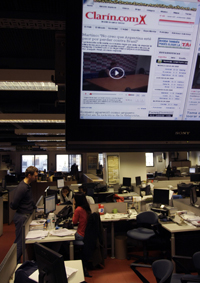In a nationally televised speech, the Argentine president said the 1976 sale of the company to Clarín and La Nación was illegal because the owner–the Graiver family–was forced to make the deal under duress from the military junta.
Papel Prensa supplies newsprint to 170 dailies throughout the country, holding 75 percent of the Argentine market. Grupo Clarín owns 49 percent of the shares; La Nación has 22.5, and the state 27.5.
Both media groups accused the government of making up an argument to take over the company, and control the material needed to guarantee freedom of expression. In a joint statement, they described the government move as an assault against the press. The timing of the accusation was also questioned in the statement: “Never, in 27 years of democracy, has Papel Prensa faced an administrative or judicial question about its origin.”
The government will submit the report to the judiciary for a full investigation, according to news accounts. Kirchner said the courts should rule on the validity of the sale, and whether the owners of the media companies should be charged with crimes against humanity.
Furthermore, the president said the executive will draft legislation to declare newsprint supply an issue of public interest subject to government regulation. Kirchner said that regulating the production, distribution, and sale of newsprint would guarantee equal access, fair prices, and distribution to all the country’s newspapers. The government accused Clarín and La Nación of using Papel Prensa to stifle competition.
But local constitutional experts have warned that a bill aimed regulating newsprint production and sale could violate the American Convention on Human Rights, La Nación reported. According to Article 13 of the convention, “the right of expression may not be restricted by indirect methods or means, such as the abuse of government or private controls over newsprint, radio broadcasting frequencies, or equipment used in the dissemination of information, or by any other means tending to impede the communication and circulation of ideas and opinions.”
The media companies strongly denied any illegality in Papel Prensa’s acquisition or other crimes. They argued that the Graiver family sold the company to get out of from bankruptcy, and not under pressure from the dictatorship. On Wednesday, both papers published a full-page ad by Isidoro Graiver, one of the members of the family who had negotiated the sale, saying it was done without threats and in total freedom.
The report was produced by controversial Interior Secretary Guillermo Moreno who has been repeatedly accused by the media companies of threats and intimidation. Earlier this month, Moreno appeared at a Papel Prensa board meeting with boxing gloves.
The report came a week after the Kirchner administration decided to cancel the license of Clarín’s Internet service provider, Fibertel. The government said Fibertel’s merger with the company’s cable television unit, Cablevision SA, was illegal. Cablevision has vowed to fight the action in court, and described the decision as “totalitarian.”
These two actions are the latest episodes in a long-running feud between the Argentine government and the Clarín Group, the largest media conglomerate. The media company, owner of newspapers, radio stations, broadcast and cable television outlets, and an Internet service provider, has had an antagonistic relationship with Kirchner since a 2008 conflict with the farming sector over a tax raise. The government has accused Clarín and other private media of biased coverage.
Journalists at Clarín and La Nación believe the government is engaged in an intimidating campaign to silence critics. But journalists sympathetic of the government said the Papel Prensa investigation is necessary to establish the role of the media during the dictatorship, and said both La Nación and Clarín have been silent about crimes committed against opponents during military rule.
Clarín has been subjected to official and other harassment, CPJ research shows. In September 2009, about 200 tax agents raided Clarín‘s offices after the paper ran a cover story alleging the government had improperly granted a farm subsidy. Clarín and others decried the raid as government intimidation. In August, the newspaper’s offices in Rosario were vandalized. The same month, posters and graffiti attacking Clarín and its executives appeared in several Buenos Aires‘ locations.
Many analysts have suggested that a 2009 sanction of the broadcast law that would create a new regulatory agency was also aimed at weakening the Clarín Group, since new regulations would force the media conglomerate to sell some of its assets. While the government said the law would curb monopolies, making radio and television more democratic, media owners and opposition politicians saw it as a means for the government to exert greater control over news content and force large media companies to divest some holdings. Several legal challenges have delayed its implementation. CPJ will monitor the implementation to ensure that the agency is not subjected to undue political interference.
